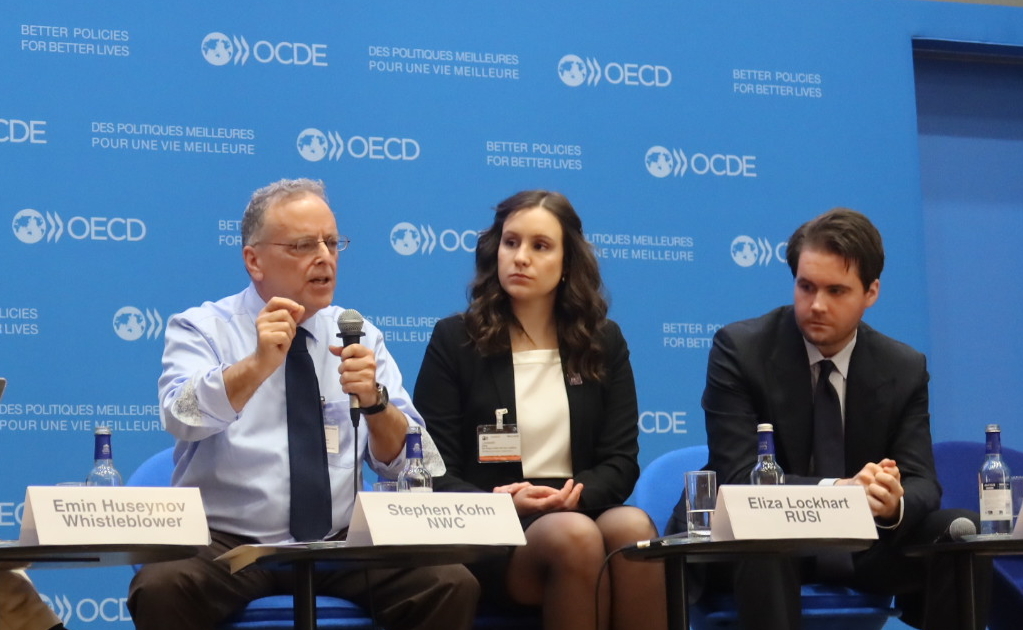India Whistleblower Law
The cost of blowing the whistle in India can come at a high price because the law does not properly protect whistleblowers. Many whistleblowers have been killed, including at least one hundred RTI-users.
However, in some cases, Indian whistleblowers can utilize transnational U.S. whistleblower laws to confidentially blow the whistle and receive substantial rewards. In less than a decade after the passage of the U.S. Dodd-Frank Act, 364 whistleblowers from India reported violations to the U.S.
Pending Whistleblower Legislation
The Parliament of India passed the Whistleblower Protection Act of 2014 over a decade ago, but the law has not been notified. Whistleblower advocates are highly critical of the law.
It establishes a flawed reporting framework, which requires that whistleblowers report issues of corruption in the public domain to “Competent Authorities,” most of whom are political leaders unequipped to conduct sensitive investigations. Depending on the case, the Competent Authority could be the Prime Minister, the Chairman of the Council of States, the Speaker of the House, the Chief Minister, the High Court, the Central Vigilance Commission, or the State Vigilance Commission. This Competent Authority framework is problematic because:
- Competent Authorities do not have the time or resources to process whistleblower claims on top of their existing jobs and duties.
- The involvement of Competent Authorities in an investigation implicitly reveals that a whistleblower is responsible for the investigation, making the whistleblower more vulnerable.
- The Act states that investigations should be discreet, but it does not enumerate procedural standards for how to conduct an inquiry. The Act includes no robust provisions to protect whistleblowers’ identities. Competent Authorities are not necessarily qualified or trained to conduct discreet investigations.
- Competent Authorities are granted all the power of a Civil Court during the investigation and are given complete discretion in determining the outcome of cases, without regard to their plausible biases.
- There is no mechanism for judicial review.
Additional problems with the Act include:
- Whistleblowers cannot report anonymously.
- There is no enforceability. Once a Competent Authority decides whether they believe the whistleblower is correct, they can recommend action to the public entity under their jurisdiction, but there is no guarantee that anything is done.
- The Act does not define victimization and its solution for victimization is to have the Competent Authority decide whether a whistleblower has been victimized and what should be done to protect them.
- The scope of who can report and who can be culpable under the Act is highly limited. It excludes the Armed Forces, the Prime Minister, Chief Ministers, Speakers and Chairmen.
- The Act only applies to corruption in the public sector and creates no mechanism to report, investigate, or sanction private entities.
- The scope of protection is limited to those who qualify as claimants under the act, meaning they made a qualified disclosure to a Competent Authority. Therefore, it excludes people who are already recognized as whistleblowers in India, including Right to Information users and those who participate in Social Audits.
Right to Information Act (RTI)
The Right to Information Act 2005 (RTI) mandates a timely response to citizen requests for government information. Citizens may use a digital portal, the “RTI Portal”, to request information from a government body. The government body is then obligated to reply to the RTI-user within 30 days or – if the matter concerns the RTI user’s life or liberty – within 48 hours.
The law, which entered into force in 2005, has enabled civil society groups to expose corrupt practices at all state levels. It is estimated that between 4,000,000 and 6,000,000 RTI requests are filed every year. In many cases, RTI users have become a new kind of whistleblower, and the RTI act has become one of the most powerful tools for fighting corruption.
However, the Right to Information Act is facing increasing legal attacks and RTI users are facing increasing physical attacks and threats. The identity of RTI users is public, leaving them vulnerable. The Mazdoor Kisan Shakti Sangathan (MKSS), which led the National Campaign for People’s Right to Information’s (NCPRI) to get RTI passed is currently tracking attacks to RTI users. They are also building solidarity worldwide to strengthen public response to the attacks against the RTI Act and its users.
Social Auditing
Social Auditing is a transparency and accountability strategy that began in India to institutionalize citizen oversight. Social audits are public meetings in which citizens collectively assess the implementation of public programs, which they are the beneficiaries of or which they are affected by. During social audits, a facilitatory independent agency will read out official records, so that citizens can compare this data with ground realities. There is a “verification exercise” that takes place, in which oral testimonies and facts on actual implementation are recorded, and the findings are read aloud. Ultimately, the process assesses whether money has been properly spent.
The practice of social audits originated in the 1990s through a grassroots struggle in the state of Rajasthan, where the Mazdoor Kisan Shakti Sangathan (MKSS) organized to enforce minimum wages in public works programs, which local elites were embezzling from. The use of social audits grew during the national campaign for India’s Right to Information Act because after obtaining government records, the public needed forums to compare them to the ground reality.
Social audits were first legally recognized in 2005 in legislation for India’s National Rural Employment Guarantee (NREGA) program.
Indian Whistleblowers can Use Transnational U.S. Laws
Foreign Corrupt Practices Act
Indian citizens who uncover securities violations or violations of the Foreign Corrupt Practices Act (FCPA) may be eligible for protection and awards under the Dodd-Frank Act. The most common violation of the FCPA is bribery. This means any American company or citizen involved in paying bribes to foreign officials to gain an unfair business advantage.
The Securities and Exchange Commission (SEC) whistleblower program, which covers FCPA violations, was implemented under Section 922 of the Dodd-Frank Act.
The SEC Whistleblower Program pays between 10% and 30% of the sanctions in cases over $1,000,000. This program also prohibits retaliation by employers. It also prevents any person from taking action to prevent a whistleblower from contacting the SEC.
Given the complex nature of FCPA whistleblowing, we strongly urge Indian citizens with information of a FCPA violation to hire a U.S.-based whistleblower attorney. They will not only inform you of your rights, but also determine if your case meets all the requirements.
Click here to see the FCPA Factsheet translated into various Indian languages.
Anti-Money Laundering Act
Indian citizens who have information about a money laundering scheme or sanctions violations, may submit their information to the Financial Crimes Enforcement Network (FinCEN) or the Office of Foreign Assets Control (OFAC).
FinCEN is a bureau of the U.S. Department of the Treasury which collects and analyzes information regarding financial transactions that involve money laundering, terrorist financing, and other crimes. Whereas OFAC manages the rules for businesses and individuals interacting with sanctioned entities.
Under AML law, whistleblowers who bring forward information about a violation of the Bank Secrecy Act (BSA), such as failure to file a Suspicious Activity Report (SAR) or failure to have a proper Know Your Client (KYC) process, may be eligible for an award of up to 30% of the monetary sanctions the government imposes, so long as the sanctions exceed $1,000,000.
The U.S. Department of the Treasury also created the Kleptocracy Asset Recovery Rewards Program, which provides awards up to $5 million to those who provide information leading to the seizure of assets linked to foreign government corruption.
Anyone can report wrongdoing, regardless of their citizenship or residency, so long as the U.S. has jurisdiction within that country.
False Claims Act and Qui Tam
The False Claims Act is a federal law that protects whistleblowers who report any individual or company committing fraud against the U.S. government. Just in 2023 alone, the U.S. Department of Justice recovered more than $2.68 billion in settlements and judgements.
Indian citizens who know of someone defrauding the U.S. government and seek an award for their information must file a qui tam lawsuit. Qui tam is a provision of the False Claims Act which allows individuals to receive a part of the damages or penalties recovered in a successful prosecution, which range between 15% and 30% of the recoveries.
Considering pursuing a False Claims Act or qui tam case? Working with a U.S.-based attorney experienced in whistleblower law is crucial. They can guide you through the process, maximize your chances of success, and protect your rights.
Examples of Indian Whistleblowers Using U.S. Laws
Whistleblower Dinesh Thakur* made almost $48 million as a whistleblower under the U.S. False Claims Act for revealing fraudulent laboratory and manufacturing practices by Ranbaxy Laboratories, India’s largest generic drug manufacturer. Ranbaxy pleaded guilty to multiple criminal felonies and agreed to pay $500 million to U.S. regulators.
“I believe there never has been a lack of intent on part of people in India to report wrongdoing. This has been amply demonstrated in Satyendra Dubey, Shanmughan Manjunath, Vijay Pandhare, Jeetandra Ghadge and more. What is missing is a proper framework or a law in India which encourages whistle-blowers to share sensitive information with government without fear” said Thakur.
*N.b. Dinesh Thakur is not a KKC Client
Indian whistleblowers: Expose wrongdoing. Get rewarded.
Have information about a major U.S. law violation? You may be eligible for a significant award. Foreign whistleblowers must work with a U.S.-based attorney if they’re seeking an award.
Get in touch with our attorneys today for a free consultation. Our experienced whistleblower attorneys can answer any questions you have and guide you through the legal process.
Additional resources
Kanuga, Sahil, “The Indian Disposition on Whistleblowing in A Private Company,” National Law Review. (October 4, 2021). https://www.natlawreview.com/article/indian-disposition-whistleblowing-private-company.
Saran, Jayant, “Whistleblower act India: Whistleblower Protection in India,” Deloitte. https://www2.deloitte.com/in/en/pages/finance/articles/whistleblower-protection-in-india.html.
Pande, Suchi, “Dying for information: Right to information and whistleblower protection in India.” U4 Anti-Corruption Resource Centre. (April 6, 2015) https://www.u4.no/publications/dying-for-information-right-to-information-and-whistleblower-protection-in-india.






